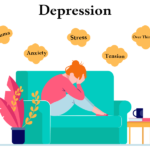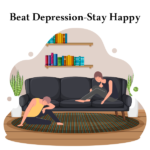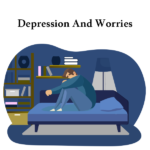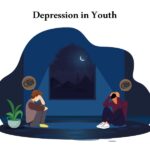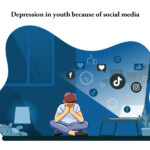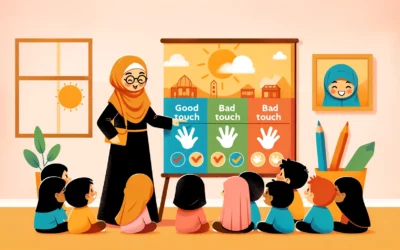When people talk about motherhood, they usually picture all those happy vibes and joy, right? But guess what? Sometimes, it ain’t all rainbows and sunshine. Ever heard of feeling angry and anxious as a new mom? Believe it or not, that’s a REAL thing. It’s called postpartum depression, and it’s legit. So, don’t be fooled by the stereotype – motherhood’s a rollercoaster, and it’s okay to feel the downs as well as the ups.
So, what is Postpartum Depression?
After a baby is born, some moms might start feeling really sad, worried, and tired. This is called postpartum depression or PPD or baby blues. It’s like a strong kind of sadness that can make it hard to take care of the baby and do regular stuff. PPD can affect how a mom feels and how she does things every day. It’s important to notice PPD and get help because it can make moms and their babies feel better.
Postpartum depression (PPD) affects a significant number of women in North America. It’s estimated that about 10-15% of women experience postpartum depression after giving birth. These numbers can vary based on factors such as cultural differences, access to healthcare, and awareness of mental health issues.
What are the signs and symptoms of Postpartum Depression?
Here are signs of postpartum depression:
- Feeling really sad
- Being extra anxious
- Feeling super tired
- Having trouble sleeping
- Not enjoying stuff
- Finding it hard to connect with the baby
- Eating changes
- Feeling guilty or not valuable
- Thinking about hurting yourself or the baby
How Islam Helps you to Cure Postpartum Depression?
If you’re a Muslim mom dealing with postpartum depression, remember that Islam and the Quran offer solutions for every challenge. Islam has got your back when it comes to dealing with postpartum depression. But hold up, gotta say, getting proper medical and psychological help is a must. That said, Islam’s teachings can give you some emotional backup and guidance when things get tough. Here’s how Islam could help you tackle postpartum depression.
Strengthen your Connection with Allah:
Feeling depressed often comes from thinking you’re all alone and nobody cares about you. But when you’re in that space, remember that Allah is always there for you. He never abandons his creations. He’s watching over you and cares for you more than 70 moms do. Allah knows your struggles, so use your feelings to get closer to Him. Spend more time with Him, whether you’re quiet or praying. Keep reminding yourself that He’s always keeping an eye on you.
Here’s a tip: imagine He’s watching you and share all your thoughts with Him. Ask Allah to heal your pain and guide you, trusting only in His care instead of others’.
Being patient (Sabr):
When postpartum depression brings challenges and sadness, practicing patience can be incredibly helpful. It means not giving up, even when things feel really hard. It means understanding that Allah’s wisdom and timing are at play.
Here’s the Tip: You’re facing a difficult journey, but you’re holding onto a strong rope. This rope is your trust in Allah’s plan. You know that He’s watching over you, and He knows what you’re going through. And just like a rope keeps you steady in rough waters, patience keeps you strong when times are rough.
So, in dealing with postpartum depression, practicing patience isn’t about ignoring your feelings. It’s about acknowledging them, seeking help, and trusting that with time and Allah’s guidance, things will improve. It’s a way of keeping your faith strong and your heart hopeful, no matter the challenges you face.
The Positive affirmations:
A powerful concept in Islam, are rooted in the Quranic verses and the sayings of the Prophet Muhammad (hadiths). These affirmations are like little nuggets of wisdom that offer guidance and encouragement to counteract negative thoughts we might have about ourselves.
Here is the Tip: Imagine you’re walking through a garden of beautiful flowers. Each flower is a Quranic verse or a hadith. These flowers are messages that remind you of your strength, worth, and potential. They’re like little boosts of positivity that help you tackle self-doubt.
When facing challenges, especially during postpartum depression, it’s common for negative self-talk to creep in. You might start feeling like you’re not doing enough or that you’re not good enough. This is where positive affirmations come in.
Think of positive affirmations as a shield against negativity. You can take these affirmations from the Quran or the sayings of the Prophet Muhammad. By repeating them and really letting them sink in, you’re building a fortress of positivity in your mind.
It’s like you’re saying, “Hey, I am strong, capable, and loved.” This kind of self-talk starts to replace those negative thoughts with empowering ones. It’s like rewiring your brain to believe in your worth and abilities.
So, when you find yourself struggling with negative thoughts during postpartum depression, turn to these Quranic verses and hadiths. They’re your tools for combatting self-doubt and nurturing self-love. Just like a garden needs care to flourish, your mind needs nurturing with these positive affirmations to grow stronger against the challenges you face.
Dua, Dua and Dua:
You might not be aware, but the Quran is filled with special prayers called Duas. These Duas are like secret weapons to help you battle feelings of sadness, depression, and improve your mental well-being. It’s a good idea to learn more about these Duas and maybe even memorize them. Memorizing them isn’t just good for your mental health – it also makes it easy to recite them while you’re doing anything else or after you finish your prayers. It’s like having a powerful tool that you can use anytime, anywhere.
Here are some small Dua’s from Quran to cure depression:
Here are a few Duas (supplications) from Islamic tradition that you can recite in Arabic to seek relief from depression and distress:
Du’a for Seeking Allah’s Help and Relief:
فَانتَصِرْمَغْلُوبٌ إِنِّي رَبِّ
“Rabbi inni maghloobun fantasir.” Translation: “My Lord, indeed I am overpowered, so help me.”
(Quran, Surah Al-Qamar, 54:10)
Du’a for Removing Grief and Distress:
لَا إِلَٰهَ إِلَّا أَنتَ سُبْحَٰنَكَ إِنِّي كُنتُ مِنَ الظَّالِمِينَ
“Lā ilāha illā anta subḥānaka innī kuntu minaẓ-ẓālimīn.”
Translation: “There is no deity except You; exalted are You. Indeed, I have been of the wrongdoers.” (Quran, Surah Al-Anbiya, 21:87)
Du’a for Seeking Allah’s Mercy and Comfort:
اللَّهُمَّ رَحْمَتَكَ أَرْجُو فَلَا تَكِلْنِي إِلَى نَفْسِي طَرْفَةَ عَيْنٍ وَأَصْلِحْ لِي شَأْنِي كُلَّهُ لَا إِلَٰهَ إِلَّا أَنْتَ
“Allāhumma raḥmataka arjū, falā takilnī ilā nafsī ṭarfata ʿaynin, wa’aṣliḥ lī shaʾnī kullahu, lā ilāha illā anta.”
Translation: “O Allah, I hope for Your mercy, so do not leave me to myself for the blink of an eye, and put all my affairs in order. There is no deity but You.” (Sunan At-Tirmidhi)
Du’a for Relief from Distress:
حَسْبُنَا اللَّهُ وَنِعْمَ الْوَكِيلُ
“Ḥasbunā Allāhu wa niʿma al-wakīl.” Translation: “Allah is Sufficient for us, and He is the Best Disposer of affairs.”(Quran, Surah Ali ‘Imran, 3:173)
Du’a for Health and Healing:
وَإِذَا مَرِضْتُ فَهُوَ يَشْفِينِ
“Wa idhā maridtu fahuwa yashfīn.” Translation: “And when I am ill, it is He (Allah) who cures me.”(Quran, Surah Ash-Shu’ara, 26:80)
These Duas for pain and depression can be recited sincerely, preferably after the five daily prayers or at any other time during the day or night. After reciting these make special dua for health of you and your baby.
Some Social Tips to Deal with Postpartum Depression:
Talk to your partner:
Now is the time to lean on your partner. But remember, they might not automatically get what you’re feeling. Nope, not a mind reader! So, have a real talk with them. Tell them what’s up, how you’re feeling, the not-so-happy thoughts, all of it. Be upfront, don’t hold back. Your partner can definitely lend a hand in getting you through this tough spot.
Talk to other mothers:
Have a chat with fellow moms, especially your own, about this postpartum depression stuff. Ask them how they felt during that time, how they bonded with their baby, and what their journey through motherhood was like. It’s like sharing notes. This can really put things in perspective and show you that you’re not sailing this ship solo. Every woman has her unique motherhood ride, and hearing their stories can help you see your situation in a more positive light.
Take professional Help:
Postpartum depression can range from mild to severe and can last for a short time or a longer stretch. It’s important to get the right professional help. Follow the prescribed medications. Attend proper counseling for PPD and stick to your checkup schedule, even if you’re not in the mood for it. Your well-being matters.
The Baby itself:
Your baby is like a remedy just by being there. Feel how that tiny one depends on you, craves your attention. Try soaking up those sweet moments with your baby. If you’re a new mom, brace yourself for these emotional and physical shifts. But keep in mind, it’s all worth it for your baby’s sake. If you’re on round two or three of motherhood, give some extra time to hang out with all your kiddos. If you can swing it, consider a family getaway to a chill and comfy spot.
Yep, postpartum depression is no joke, and only the one dealing with it really knows how tough it can be. But hold up, in the Quran, Allah’s got a reminder: after every tough time, there’s a smoother ride. Keep that in mind and tackle postpartum depression with grace. Trust me, you’ve got this!









